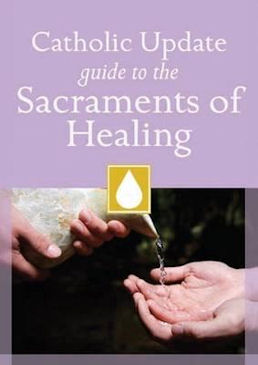
|
Posted
January 13, 2013
Book: Catholic Update guide to the Sacraments of Healing Series Editor: Mary Carol Kendzia Franciscan Media. Cincinnat. 2012. pp. 51 An Excerpt from the Jacket:
Drawing on the trusted and populare Catholic Update newsletter, the Catholic Update Guide to the Sacraments of Healing will answer your questions about the sacraments of reconciliation and the anointing of the sick whether you're new to the Church or need a refresher on these healing gifts. An Excerpt from the Book: What is Reconciliation? Father Thomas Richstatter, O.F.M., explains what we mean by the sacrament of reconciliation. He begins with a story that happened in the 1930s when Fr. Bernard Haring, a moral theologian, was the pastor of a parish in Germany. Duringa weekly class Fr. Haring was talking about confession, and began by asking the congregation, "What is the most important thing about confession? " A woman in the front pew immediately answered, "Telling your sins to the priest. That's why we call it confession." Fr. Haring said, "Confessing your sins is important, but it's not the most important things." A man toward the back called out, "Contrition! Being sorry for your sins! The whole thing doesn't work without contrition." Fr. Haring said, "That is right, it doesn't work without contrition, but I don't think that contrition is the most important thing. A man over on the left side of church spoke up, "It's the examination of conscience. Unless you examine your conscience, you don't know what you have to be sorry for and you don't know what to confess. Anybody can see that the examination of conscience is the most important thing." Fr. Haring wasn't satisfied with this answer either. A young woman on the aisle tried, "It's the penance --- giving back the things you stole --- unless you do penance, it doesn't count." The congregation could tell by Fr. Haring's face that he still hadn't heart the most important thing. An uneasy silence fell over the church as the people tried to think. In the silence a little girl in the third pew said, "Father, I know what's most important. It's what Jesus does!" Fr. Haring smiled, She had it right. It's what Jesus does! . . .All sins are forgiven when we plunge into the death and resurrection of Jesus at baptism. . . .Sacraments are acts of worship in which we gather to celebrate what God has done for us.In reconciliation we do not celebrate our sinfulness. We celebrate who God is and what God has done for us in Christ. This is very different from my memories of the dark confessional, of fearing the priest, of telling all my sins, of worrying whether I forgot something big. in that setting I was focused on what I was doing (confessing) rather than on what God was doing (forgiving). However you celebrate the sacraments, remember the most important thing: "what Jesus does!" Amen! Table of Contents: 1. The healing sacrament of reconciliation 2. The healing sacrament of the anointing of the sick |
|
